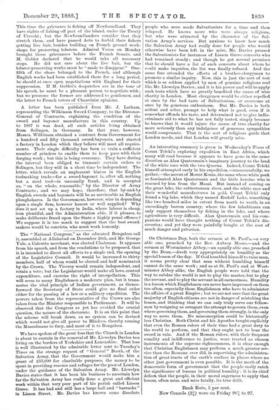We have spoken of the great loss that the Church
in London is about to sustain in the removal of Mr. Llewelyn Davies to a living on the borders of Yorkshire and Lancashire. That loss is well illustrated by the admirable letter sent to Tuesday's Times on the strange request of "General" Booth, of the Salvation Army, that the Government would make him a grant of 215,000 for charitable purposes, the money to be spent in providing rescues and refuges for the poor of London, under the guidance of the Salvation Army. Mr. Llewelyn Davies states that it has been his business to ascertain how far the Salvation Army has really done a great and efficient work within that very poor part of his parish called Lissom Grove. It has had and still has a large hall and " barracks " hi* Lisson Street. Mr. Davies has known some dissolute people who were made Salvationists for a time and then relapsed. He knows more who were always religious, but who were attracted by the character of the Sal- vation Army's services. But anxious to know how much the Salvation Army had really done for people who would otherwise have been left in the mire, Mr. Davies pressed. the Salvationists for instances of Lisson Grove converts who had remained steady; and though he got several promises that he should have a list of such converts about whom he could make inquiries, the list was finally refused. And the same fate attended the efforts of a brother-clergyman to promote a similar inquiry. Now, this is just the sort of test which is so seldom applied by men of genuine religious zeal like Mr. Llewelyn Davies ; and it is his power and will to apply such tests which have so greatly benefited the cause of wise charity in London. Most clergymen would be either repelled at once by the bad taste of Salvationism, or overcome at once by its generous enthusiasm. But Mr. Davies is both ardent and sober, prompt to help what is good, even if it somewhat offends his taste, and determined not to give indis- criminate aid to what he has not fully tested, simply because he knows that it would injure the cause of true charity far more seriously than any indulgence of generous sympathies would compensate. That is the sort of religious guide that London needs, and that London will greatly miss.


































 Previous page
Previous page